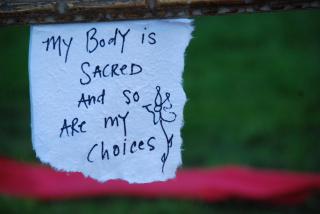The Origins of the Anti-Choice Movement
In the 1970s, a few rich, powerful, white, (outwardly) straight men got worried about losing their right to continue racially segregating their private Christian schools and maintaining their tax-exempt status. Those men began to feel their money and power being threatened by the civil rights movement. In order to regain control, they needed to identify an issue that would be emotional and galvanizing enough to unite and politically activate their evangelical followers for the first time.
They decided to focus on abortion. Before then—a full six years after the Roe v. Wade Supreme Court decision—the prevailing evangelical position was that life began with the baby’s first breath, at birth. Most evangelical leaders had been indifferent to the Court’s decision in Roe, and some were cited as supporting the ruling. Not anymore. They wrote a new memo using freshly feigned outrage and rhetoric calling for “a holy war…to lead the nation back to the moral stance that made America great.” They sponsored a meeting of 15,000 pastors—called The Religious Roundtable—to train pastors on how to convince their congregations to vote for antichoice, antigay candidates. This is how they disseminated the memo down to evangelical ministers, who passed it down to pews across America. The memo read, To be aligned with Jesus, to have family values, to be moral, one must be against abortion and gay people and vote for the candidate that is antiabortion and antigay.

Presidential candidate Ronald Reagan—who, as governor of California had signed into law one of the most liberal abortion laws in the country—began using the language from the new memo. Evangelicals threw their weight behind him, and voted in a bloc for the first time to elect President Reagan. The Religious Right was born. The face of the movement was the “pro-life and pro-family values” stance of millions, but the blood running through the movement’s veins was the racism and greed of a few.
That is how white evangelicals became the most powerful and influential voting bloc in the United States and the fuel of the American white supremacy engine. That’s how evangelical leaders get away with the stunning hypocrisy of keeping their money, racism, misogyny, classism, nationalism, weapons, war, and corruption while purporting to lead in the name of a man who dedicated his life to ending war, serving orphans and widows, healing the sick, welcoming immigrants, valuing women and children, and giving power and money away to the poor. That is also why all a political candidate must do to earn evangelical allegiance is claim to be anti-abortion and anti-gay—even if the candidate is a man who hates and abuses women, who stockpiles money and rejects immigrants, who incites racism and bigotry, who lives in every way antithetical to Jesus’s teachings. Jesus, the cross, and the identity “pro-life” are just shiny decals evangelical leaders slap on top of their own interests. They just keep pushing the memo: “Don’t think, don’t feel, don’t know. Just be against abortion and gays and keep on voting. That’s how to live like Jesus.” All the devil has to do to win is convince you he’s God.
This is an excerpt (pp. 241-242) from Untamed.